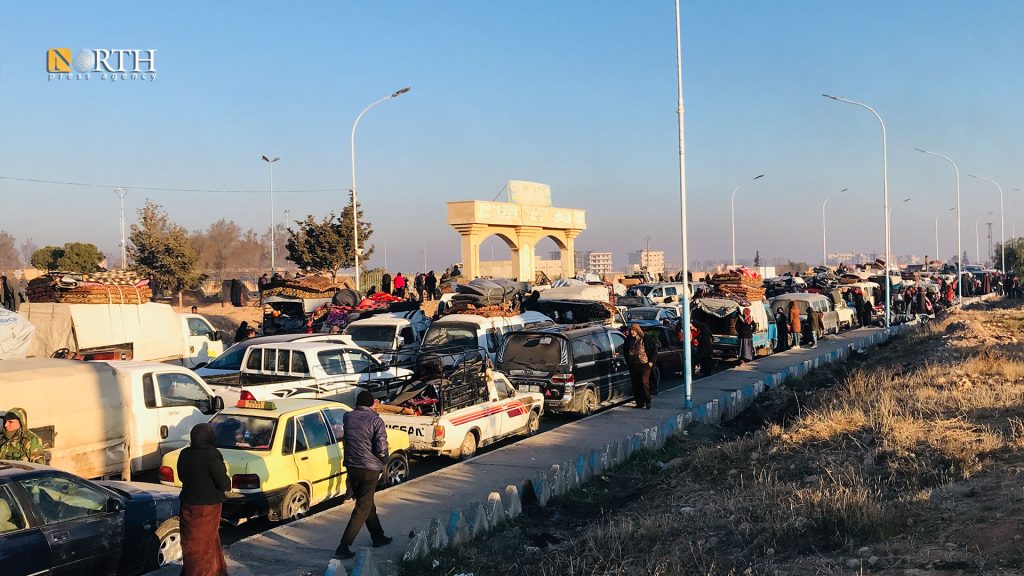Kurdish doctor’s harrowing tale of displacement from Aleppo to Raqqa
RAQQA, Syria (North Press) – After a grueling and perilous journey on a motorcycle, Shahdar finally reached the city of Tabqa in northern Syria, unsure of how he had survived. Upon arrival, he asked the locals waiting for displaced persons, “Where am I?”
Shahdar Osso, a dentist from the town of Tel Rifaat in northern Aleppo, fled alongside a convoy of displaced residents from Tel Rifaat and northern Aleppo, locally known as Shahba region, to the city of Tabqa after Turkish-backed opposition factions, took control of the area. Lost and disoriented, he recalls the arduous details of his escape on a motorcycle.
On Monday evening, thousands of Afrin IDPs from Tel Rifaat and Shahba region arrived in Tabqa through a secured humanitarian corridor.
Sheikhmos Ahmed, head of the camps office of the Autonomous Administration of North and East Syria (AANES), tells North Press that an estimated 120,000 people are expected to flee from northern Aleppo to northeastern Syria.
“They will kill us all”
The displaced doctor recounts to North Press, “An hour before the Syrian National Army factions entered Tel Rifaat, we headed toward the al-Ahdath village.”
He described how, upon reaching al-Ahdath, “The factions surrounded us and demanded we head to Afrin. But the people refused—we were thousands in number.”
Returning to Afrin, he explains, “was equivalent to suicide. They would kill us all, as they had done to the residents of Nubl and Zahraa.”
Shahdar recalls the terrifying moment when they realized they were trapped. “As we approached al-Ahdath, I stood with three others and learned that we were encircled. The SNA factions behind us and al-Nusra Front militants ahead of us.”
He describes the heartbreaking scene as fear and despair consumed them. “Next to me stood a displaced man from Afrin named Abdulrahman, in his forties.” Abdulrahman, holding a Kalashnikov, said, “I will not surrender to them,” and shot himself in the neck.
According to information shared on social media by Afrin residents, Abdulrahman Murshid, a father of three, took his own life at the Sardam camp junction in Shahba before militants of al-Nusra Front reached them.
“We left his body on the road and could not bury him,” Shahdar said.
During the convoy’s journey toward northeastern Syria, two children died due to walking in the cold, and two elderly individuals succumbed to illness, according to Shahdar.
Humiliation
Shahdar recounts his fear-laden encounters with al-Nusra Front militants. “They all had beards. Every 20 meters, there was a gunman aiming his weapon at us. Some were masked, shouting ‘Allah Akbar.’”
He vividly recalls witnessing brutality, saying, “In Nubl and Zahraa, Turkish-backed factions committed a massacre against the residents because they were Shia.”
After leaving Tel Rifaat, the convoy passed through several areas. Along the way, they were informed that displaced persons’ homes and shops in Tel Rifaat and Shahba had been looted by the SNA factions.
“In every area, we were insulted,” Shahdar says. Armed men heavily surrounded them, their weapons pointed at the civilians. “They spat in our faces, calling us ‘pigs’ and threatening that they were coming for Manbij.”
The militants insisted the IDPs head toward Afrin, claiming they would soon attack Manbij.
When they reached areas controlled by Turkish-backed SNA factions, “There, I encountered fighters of various nationalities, including Chechens and Uyghurs. You could tell by their features,” Shahdar recounts.
The SNA factions filmed the displaced while cursing them, calling them “dogs of the SDF.” “I felt humiliated every moment,” he says.
Eight hours of terror
After crossing areas controlled by the factions at the Dayr Hafir junction, where the Syrian Democratic Forces (SDF) held ground, the atmosphere shifted. “The treatment was different, but we still could not believe we had survived,” Shahdar says.
The journey took eight harrowing hours. “Those eight hours were filled with fear and constant anxiety, witnessing horrifying scenes and death,” he adds.
The situation in Tel Rifaat and Shahba, he says, was catastrophic. Families who stayed behind remain unaccounted for, as they lacked the means to flee. Others went missing, their fate unknown.
Having married just a month ago, Shahdar shared that his wife was in Aleppo during the attack and fled ahead of him to Kobani. He is now reunited with her after joining the displaced convoys in Tabqa.

